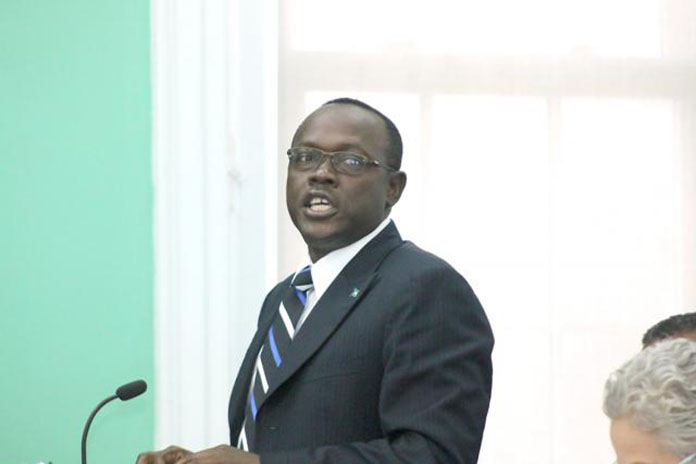
CHESTER COOPER MP, Exumas and Ragged Island, PLP Deputy Leader
REMARKS ON DEBATE OF THE PROCEEDS OF CRIME BILL AND THE FINANCIAL TRANSACTIONS REPORTING BILL
MARCH 1, 2018
Thank you Mr. Speaker,
I am most grateful to the wonderful people of The Exumas, Exuma Cays and Ragged Island for allowing me to stand on their behalf to contribute to debate on these bills.
Let me first take this opportunity, however, to thank the Hon Minister of Works, the member for Carmichael has been very forthcoming in answering questions and issues put to him by the public and myself in relation to Ragged Island., I must once again remind the government that the people of Ragged Island are still in need and still wait for the complete restoration of government services on the island. I trust the honorable minister of works is giving the situation his full attention and we will get a communication from him on this in short order. I also thank the Minister of Health for the work he is doing behind the scenes to restore medical services to Ragged Island and addressing issues with the mini hospital in Exuma. I sincerely thank him.
Mr. Speaker, I stand to contribute to the debate on two pieces of legislation that can have fundamental impact on the Bahamian people, not just in Financial Services but also across the business community, throughout the spectrum of politics and the Bahamian people at large.
However, let me first say a word on the recently passed Credit Reporting Bill 2017, which was debated and sent to the Upper Chamber without a single word from the opposition, whilst the palace intrigue played out in this place the other day.
Had we been allowed to properly debate the legislation, I would have supported it with a few recommendations to strengthen it and protect vulnerable Bahamians.
It is my view that, over time, the bill will bring certain benefits including enhancing the integrity of the financial system, ultimately reducing loan arrears, and these are ideals I support. However, in the short to medium term it is the small man who would feel significant pain as a result of its implementation.
In theory, the Bill will allow banks and other lenders to access data on every individual and corporate borrower in the country, enabling them to assess credit worthiness of applicants, looking at existing obligations and track records with other institutions. There is currently no effective mechanism to track an individual bouncing from one institution to another leaving a trail of unpaid debts behind.
The bill will also access to information from utility companies, and not only impact an individual’s ability to get a loan but might impact their ability to rent an apartment or in some cases used in pre-employment checks and impact their ability to find meaningful employment. Bahamians, particularly those “maxed out” or having experienced default or non-payment, are likely to experience major adjustments.
I trust therefore that as a matter of urgency, the Government, with the support of lenders, will undertake appropriate education of the public beginning immediately so that Bahamians can have time to improve their situations by stopping unnecessary use of credit cards, paying their debts on time and not missing payments.
There is much to be said about personal responsibility, Mr. Speaker.
However, we must also ensure we have appropriate mechanisms in place to protect those, particularly government workers, utilizing salary deductions from many institutions that have and continue to make their fortunes on their backs. What we see in some cases is unconscionable and the Government has a role to protect the vulnerable.
In my career, I have seen Government workers taking home as little as $36 a month.
Mr. Speaker, this is a troubling trend and no doubt leads to more troubling social ills. The question is how do you live as a single mother on $36 a month?
There is also much to be said about improving our national savings rate, which is at a severe level with Bahamians having only a few hundred dollars in their bank accounts on average.
I call on the Government, to lead a national Savings Campaign with support of Banks and Financial Services institutions.
Improving savings is not only good for families but also good for capital markets and national development.
Also, we must ensure, Mr. Speaker that the regulators of this Bill ensure an obligation to confidentiality of people’s information in this system as well as guarding against accessing information retroactive to the implementation of this Bill. No doubt the competent authorities will be on top of this.
I guess it’s a little late now, Mr. Speaker, but I wanted my concerns noted for the record.
On the Financial Transaction Reporting Bill and the Proceeds of Crime Act, Mr. Speaker, let me say at the outset that nobody need guess, I’m going to vote in favor of both pieces of legislation, though they are far from perfect; if indeed there is any such thing as perfect legislation.
I don’t plan to spend my time in this place during this term opposing just for opposing’s sake.
This administration believes that these bills will help curb, corruption, money laundering and terrorism; I am on record as supporting those ideals.
And, if the laws prove ineffective, over-reaching or infringe too deeply on the rights of Bahamians, then when the PLP retakes the government in 2022, we can and will amend them if necessary, with the benefit of practical experience.
But until that time Mr. Speaker, let me urge the government to consider the sound and practical advice of practicing professionals in the industries impacted so as to not risk over-regulation.
We must not simply accept lock, stock and barrel the suggestions of international bodies without localizing them in our best interest as a jurisdiction.
Yes, we must address international concerns as we operate in a global environment, but we can’t do that at the expense of killing businesses and industries that are the lifeblood of thousands of Bahamians.
So, in principle, I support the intent of the legislation.
I believe that the Bill would result in the strengthening of anti-money laundering protocols but I have some concerns.
Let me say in full disclosure that I have personal financial interests in the financial services and insurance industry, as well as the money transfer business that the existing Financial Reporting Transactions legislation already regulates – though I believe that is public knowledge.
At the very least, Mr. Speaker, that should tell you that I know something about what I speak.
I’m not going to go through the entirety of both bills, but I’d like to point out some areas that I think warrant clearer definition and description, or could be problematic.
Mr. Speaker, in the previous version of this legislation, Section 3 states the definition of Financial Institutions and implicitly includes the Property & Casualty / General insurance industry in this definition.
I applaud the government for having the good sense to take this provision out and for realizing, it appears, that it is absolutely essential for meaningful industry consultation when dealing with these wide-ranging pieces of legislation. Financial services providers are generally deeply committed to protecting the credibility and integrity of their industry. We must not over regulate this sector as we arguably did in 2000. Industry knowledge is not easily duplicated.
Politicians are not anointed to be “all-knowing” upon their election or appointment to the Senate and Cabinet. I am happy that the attorney general, who was previously adamant that he was leaving general insurance in this definition, has now earnestly consulted and agreed to remove it – although I have not seen the amendment yet.
It is globally accepted that the insurance industry, in particular General Insurance i.e. the property/casualty insurance sector in particular, pose minimal risk of money laundering and terrorism financing to countries’ economies.
It was also of great concern, Mr. Speaker, that a simultaneous increase in administrative costs and premium rates would make general insurance less affordable for Bahamians and legal residents.
It is a relief to the sector not to have another burdensome hoop to jump through and another weight to put on the backs of Bahamian consumers.
So let’s talk about some other areas of the bill.
With regard to the money transfer business, Mr. Speaker. This industry is already tightly regulated by the Central Bank of the Bahamas. Major money transfer companies like Cash N Go already adopt these standards.
As a general point, we must take care not to over-regulate and put up unnecessary barrier for businesses to do business in The Bahamas.
It’s already hard enough.
We put up barriers to commerce that prohibit the smooth functioning of business.
For example, why do I need an NIB card to license a motor vehicle?
Why do I need to pay real property tax for individual directors serving on Boards to get a tax compliance certificate?
Just two examples of government overreach that should be discontinued, Mr. Speaker.
These are the kinds of things that I call vexing business issues. My friend from Free Town often railed on these issues before his anointing to high office. I trust that he will not allow himself to be silenced.
With regard to Clause 6 of the bill, Mr. Speaker, regarding customer due diligence by financial institutions.
We must not, and let me say it again, WE MUST NOT overregulate the financial services sector, especially when it comes to low-risk accounts. We must balance the need for regulation and the need for more ease of doing business to remain a vibrant competitive jurisdiction. Domestic banks are already applying a sledgehammer in some cases where a fly swat will do.
And I know what the side opposite will say. It will say this legislation is desperately needed to come in line with international commitments. But again, Mr. Speaker, we must strike a balance.
We must not fold our tent. We must not just have legislation thrust upon us.
We must respect that we live in a global village with interconnected systems.
However, we must assert our understanding of local context and the realities with respect to the bigger global picture.
If we react to harshly, we run the risk of starving to death, an already diminished financial services sector.
This Parliament must defend our sovereign turf and not accept what is sent to us hook line and sinker.
If G20 countries like the U.S. and Great Britain have standards that are acceptable to them that are simpler than ours, surely they can’t object if we are doing what they are doing.
If it’s good enough for them, how is it not good enough for us?
So, Mr. Speaker, We have to be forward looking.
I support the legislation, but continued attacks on our sovereignty are to be expected. And the government must be prepared to speak up on behalf of small open economies perhaps in unison with our Caricom countries.
Next, they will come after foreign direct investment regime and the tax concessions we offer.
We must defend our territory from the microscopic analysis and demonization of everything they deem to be a threat to their own practices that do not benefit us.
I note in many of the discussions in relation to the IMF that the Government appears to be adopting their suggestions as their Government’s policy. This is not appropriate in my view. I heard the Hon Minister of Foreign Affairs, the member for North Abaco talk about corruption. Transparency International ranked the Bahamas 28th in 2017 down from 71st in 2015 and 61st in 2016. So there was significant improvement on that measure. We are ranked the least corrupt in the Caribbean. No we are not perfect, but we must stop talking down our country – stop talking down our Economy – especially on the international stage.
Let me just pause here since we’re on foreign direct investment.
Mr. Speaker, I asked at a recent public gathering outside this place that was nationally televised, about this deal that the government has announced with Oban Energies. Now, Mr. Speaker, the other side seems to be saying that since the last administration, which they try to brand as irredeemably corrupt, approved a deal in principle with Oban Energies with the caveat that it gets regulatory approval from numerous government agencies, that this makes it okay for the current administration to sign a heads of agreement with this company.
I said at that meeting that the government needs to show me the money of this deal. And yet, nobody has yet shown me the money. They’ve shown me empty talk. They’ve shown me an investor admitting that they don’t have the money yet and only the heads of agreement will release this money, which is just incredible. But I have yet to see this $5.5 billion that’s supposed to go in the ground on Grand Bahama.
On top of that, Mr. Speaker, in the context of the bills we’re talking about today – the Financial Transactions and Reporting Act and the Proceeds of Crime Act, where does this Oban Energies deal fit in with the government’s soapbox stance on due diligence, anti-corruption, accountability and transparency? I trust that the company, its Principals and Associates will past the fit and proper thresholds and due diligence guidelines laid out in these Bills.
The timing of this debate is ironic.
But God is a Just God.
I am pro-business and pro investment.
We need FDI to develop our country in an orderly way and create opportunities, but not at the cost of our reputation.
I have many more questions but I will leave it there for now.
Penalties
Getting back to the bill. The penalties for certain infractions under this bill also seem to be quite high, Mr. Speaker.
For example, if a financial institution opens up one single account without KYC, it is subject to a fine of up to $1 million dollars.
An individual can be fined up to $500,000 for a similar offence and have the unintended consequence of potentially shuttering a financial institution.
I’m not so sure potential insolvency should be the remedy for a possible violation of this legislation.
The fines under the existing legislation are high but not unreasonable. Perhaps these should be maintained.
Governance Issues
Mr. Speaker, the definition of politically exposed person (PEPs) also seems extremely broad. The bill should clarify whether directors of state-owned corporations qualify as PEPs. The definitions on page 9 of “senior management” of state-owned corporations, as PEPs seem to suggest this is so.
It is my view that every individual serving on a Government Board will be a PEP under this legislation. I am certain that they didn’t sign on for that and you will see some resignations effective immediately on implementation of this Bill!
These directors would populate an already small pool of people serving in this capacity. The government must take care not to reduce the pool of persons willing to serve in these positions.
The government should also address the very tribal nature of such appointments, keeping in mind that all Bahamians, PLPs, FNMs and everything in between must be utilized to move the nation forward. I would in fact recommend that when a new Government comes in that they consider leaving a few of the competent Directors of the previous Boards in place for continuity especially in highly technical businesses like BPL and Bank of the Bahamas for example. The pool of suitable Directors is decidedly small and we must use the best and brightest in our country to advance our institutions. The political cleansing that we see after a change in Government is not fitting of a modern progressive society and I call for more political maturity in this regard.
The broad definition and interpretation of PEPs is troubling. Whilst I have signed on to offer for public office I did not ask permission of my 12 siblings and Associates who would also be captured in the net. Again we must not diminish the already small pool of persons committed and qualified to offer to serve.
So, Mr. Speaker, we must take care not to become further uncompetitive with such sweeping changes and the government must fully lean on its practicing professional to guard against measures increasing the cost of doing business and reducing the desirability of the jurisdiction.
.
Mr. Speaker, wrapping up my remarks on this legislation, we have to guard against making it more difficult to do business and making The Bahamas less competitive.
It is already more onerous to open a bank account in The Bahamas than the U.S. Will these measures truly benefit the ease of doing business?
I would find it hard to swallow that the FATF, CATF and OECD believes that the standard the USA uses is not sufficient for The Bahamas.
I am told that a Bahamian can walk into a bank off the street in Florida and leave in 15 minutes with a bank account, with cheques and a debit card. Whilst this process can already take weeks in the Bahamas for the same individual.
U.S. banks in states like Delaware, Wyoming, Nevada and Oregon are already “capturing” much of our traditional financial services business with proverbial onshore financial centers raiding the business of offshore financial centers.
We must not shoot ourselves in the foot by going further than the international standard and undermine efforts aimed at making The Bahamas more competitive as an International Financial Center. We only need consider how we lost the captive insurance market, and how Bermuda continues to benefit from that move. There must be balance.
Proceeds of Crime Bill
With regard to Proceeds of Crime Bill, Mr. Speaker, I do have one major concern.
Looking at Section V of the bill, Mr. Speaker, it speaks to the seizure of assets without a conviction.
Mr. Speaker, it says: The Court, on an application by the enforcement authority, shall grant a civil forfeiture order in respect of property within the jurisdiction of The Bahamas where it finds, on a balance of probabilities, that such property is proceeds of criminal conduct, an instrumentality or terrorist property.
There is a provision where a confiscation order may be had if a person is charged. Mr. Speaker, I implore the government to seriously look into whether this section can stand up to constitutional scrutiny. The threshold for charging someone is not very high, Mr. Speaker. We should not, in our haste, be so quick to leave behind the basic tenet of law that a person is presumed innocent until guilt is proven.
The provisions in this section could potentially backfire cause significant hardship if we get it wrong and lead to costly lawsuits against the government, for which the Bahamian people will have to ultimately foot the bill. We must take care that this and other provisions of the Bill do not infringe on the constitutional rights of Bahamians.
In closing, Mr. Speaker, I support these two pieces of legislation but I do hope the governing side will consider the concerns I have raised, which I believe echo those of stakeholders who will ultimately be affected. I trust that in the spirit of political maturity they would consider my interventions and review my suggestions for amendments.
On behalf of the people of the Exumas and Ragged Island, I thank you.







